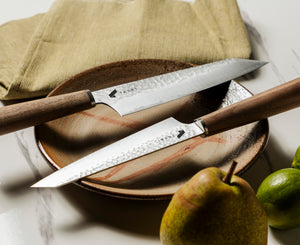Japanese Knives Captivating the World:
Where Tradition Meets Innovation
The Growing Global Demand
The Wall Street Journal recently reported "Why Sushi Chefs Pay Up to $20,000 for These Stainless Steel Knives," while Kyodo News highlighted "Japanese knife makers helping world's best chefs stay a cut above."
Tourists flooding into Japan are making kitchen supply districts a must-visit on their travel itineraries. The world is taking notice of the precise and sophisticated cutting techniques that only Japanese knives can achieve.
By 2022, Japan's knife exports had quadrupled compared to two decades earlier. What is it about these Made-in-Japan blades that makes them so irresistible to chefs worldwide?

The Harmony of Tradition and Technology
To find one answer, let's journey to Seki City, Gifu Prefecture - Japan's sacred ground of knife making.
Alongside Solingen in Germany and Sheffield in England, Seki is recognized as one of the world's three major cutlery centers. At its heart stands a company that has led knife making for over 100 years. It is here that Taski knives are brought to life by master craftsmen.


Seki has preserved sword-making techniques for nearly eight centuries. The city has historically possessed everything needed for blade making: high-quality clay for blade tempering, charcoal for heat treatment, and pure water. The Nagara and Tsubo rivers flowing through the city have provided not only essential water but also convenient transportation routes.

During the Muromachi period (1336-1573), Seki was home to around 300 master swordsmiths. Their blades were legendary, renowned for being "unbreakable, unbendable, and razor-sharp" - truly first-class weapons of their time.
Taski's knife makers continue this tradition while embracing innovation, earning high praise from chefs worldwide. What sets them apart is their distinctive approach to perfection: rather than relying solely on hand craftsmanship, they've chosen to blend traditional skills with modern technology.
For blade grinding, they were among the first in Japan to implement advanced equipment capable of 0.001mm precision (with craftsmen constantly fine-tuning the machinery). While the final touches and handle-work - the parts that connect with the user - are always completed by hand.

Although there is a widespread tendency to favor purely handcrafted products, their passion is firmly focused on one goal: how to consistently produce knives of the highest possible quality.
The fact that a company with over 100 years of history, operating in a region with centuries of blade-making tradition, can take such an innovative approach might explain why Japanese knives are experiencing a global renaissance in recognition.

A Tool With a Soul
During the manufacturing process, the iron structure transforms almost like a living organism. The craftsmen pursue the perfect balance between blade flexibility and hardness to create the finest knives.

But the journey of a knife doesn't end when it leaves the factory. Once in the hands of its user, these knives become more than tools - they become partners that grow with their owners in their kitchens. This special bond between knife and user, whether professional chef or home cook, is what we at Taski strive to create.


There was an unforgettable moment during our first factory visit. The factory manager shared these timeless words: 'Without happy craftsmen, great products cannot be born.'
These words deeply moved us. The craftsmen work silently, focused entirely on their blades. They communicate through their posture, their handling, their occasional shy smiles, and their intense gazes - sharper than the blades they craft. There's an undeniable authenticity that can only be felt by being there: these people undoubtedly create exceptional knives.

The world's fascination with Japanese knives goes beyond their sharpness.
They contain the pride and passion of the craftsmen. They hold the soul of artisans who continuously refine their skills, always thinking of the user's joy.
And we believe that when you hold our knives, you'll feel this spirit too.





